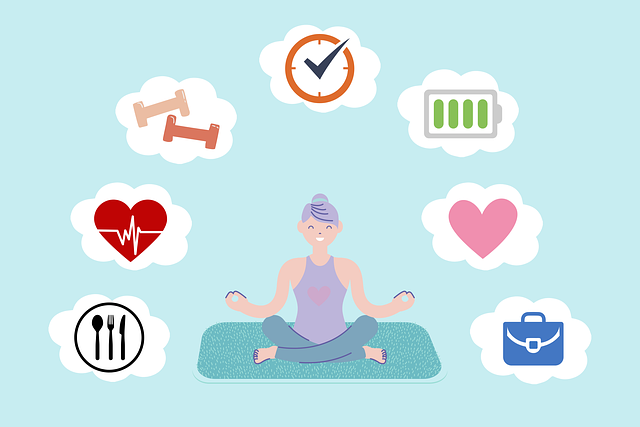Self-care is an essential practice for maintaining physical and mental well-being, as emphasized by Broomfield Sexual Dysfunction Therapy. It involves intentional actions like exercise, healthy eating, and mindfulness to manage stress, build resilience, and enhance overall mental health. By acknowledging the connection between sexual health and emotional well-being, Broomfield Sexual Dysfunction Therapy offers personalized strategies such as Mind Over Matter principles, open communication, and setting boundaries. Integrating self-care into daily routines, even with small time investments, improves emotional well-being. Neglecting self-care is common due to busy lives but it's a key mental health component. Broomfield Sexual Dysfunction Therapy provides guidance on overcoming barriers, promoting cultural sensitivity, and creating safe spaces for individuals to view self-care as an act of self-preservation.
Self-care is an essential practice for maintaining mental health and overall well-being, yet many struggle to incorporate it into their routines. This article explores the transformative power of self-care through the lens of Broomfield Sexual Dysfunction Therapy. We’ll delve into understanding its impact on mental health, identifying personal needs, integrating self-care daily, and overcoming barriers. Discover practical strategies to enhance your well-being and embrace a more balanced life, guided by the expertise of Broomfield Sexual Dysfunction Therapy.
- Understanding Self-Care and its Impact on Mental Health
- Identifying Personal Self-Care Needs: A Broomfield Sexual Dysfunction Therapy Perspective
- Integrating Self-Care into Daily Life: Strategies for Consistency
- Overcoming Barriers to Self-Care: Tips from Broomfield Sexual Dysfunction Therapy
Understanding Self-Care and its Impact on Mental Health

Self-care is a practice that involves intentional actions to promote physical and mental well-being. It’s not just about taking time for yourself, but also understanding your needs and prioritizing them. When we talk about self-care, we often focus on activities like exercise, healthy eating, and adequate sleep – crucial components in maintaining good physical health. However, it goes beyond the physical; it encompasses emotional well-being promotion techniques such as mindfulness practices, journaling, and engaging in hobbies that bring joy. These practices are essential for managing stress, fostering resilience, and enhancing overall mental health awareness.
In today’s fast-paced world, where the demands of daily life can be overwhelming, incorporating self-care becomes even more vital. Broomfield Sexual Dysfunction Therapy, for instance, recognizes the profound impact of emotional well-being on sexual health and relationships. By integrating self-care practices into our routines, we can prevent burnout, improve crisis intervention guidance, and ultimately lead happier, healthier lives. Mental health awareness campaigns highlight the significance of self-care as a proactive approach to maintaining psychological equilibrium.
Identifying Personal Self-Care Needs: A Broomfield Sexual Dysfunction Therapy Perspective

Identifying Personal Self-Care Needs from a Broomfield Sexual Dysfunction Therapy perspective involves delving into one’s emotional and physical well-being. This holistic approach recognizes that sexual health is intricately linked to overall mental and physical health, emphasizing the importance of addressing underlying issues that might manifest as sexual dysfunction. Therapists at Broomfield Sexual Dysfunction Therapy utilize Mind Over Matter principles to help individuals understand their bodies and minds better, fostering a deeper connection that can significantly impact mood management.
Effective self-care involves tailored strategies based on individual needs. For some, this could mean incorporating regular exercise or mindfulness practices to manage stress and improve mood. Communication strategies are also crucial; open dialogue with partners about desires, concerns, and boundaries not only enhances intimacy but also promotes a sense of security and validation. By embracing these tools, individuals can create a more fulfilling life, where their sexual health is an integral part of their overall well-being.
Integrating Self-Care into Daily Life: Strategies for Consistency

Integrating self-care into daily life is a transformative journey that requires consistent effort and mindfulness. Many individuals, particularly those seeking Broomfield Sexual Dysfunction Therapy, often overlook the significance of self-nurturing in their busy schedules. However, making self-care a habit can significantly enhance mental health and emotional well-being. Start by identifying small pockets of time throughout your day—even just 15 minutes—to practice mindfulness, exercise, or engage in hobbies that bring you joy. These moments can be as simple as deep breathing exercises during a quiet morning or a short walk during lunch break.
Consistency is key when it comes to reaping the benefits of self-care. Consider designing your own Mental Health Education Programs that cater to your unique needs and preferences, incorporating Emotional Intelligence techniques to better understand and manage your emotions. Regularly evaluating your progress and adjusting your strategies can help maintain momentum. Remember, small, sustained actions contribute to long-term improvements in emotional well-being promotion techniques, fostering a healthier, more balanced lifestyle.
Overcoming Barriers to Self-Care: Tips from Broomfield Sexual Dysfunction Therapy

Self-care is often overlooked due to busy schedules and societal pressures, but it’s a crucial aspect of mental well-being. Broomfield Sexual Dysfunction Therapy offers valuable insights on overcoming barriers that might prevent individuals from prioritizing self-care. Many people struggle with setting boundaries, feeling guilty about taking time for themselves, especially in cultures that promote self-sacrifice. However, therapy emphasizes the importance of recognizing these feelings as signs of burnout and not strength.
Broomfield Sexual Dysfunction Therapy suggests practical tips like starting small with manageable activities such as mindfulness exercises or short walks. They also advocate for crisis intervention guidance, ensuring individuals have tools to manage sudden stress. Additionally, cultural sensitivity in mental healthcare practice is vital, recognizing that diverse populations may have unique barriers and needs. Empathy building strategies can help create safe spaces where individuals feel understood, encouraging them to embrace self-care as an act of self-preservation rather than indulgence.
Self-care is a transformative practice, and as demonstrated by Broomfield Sexual Dysfunction Therapy, understanding and prioritizing personal needs is key to mental well-being. By integrating self-care into daily routines, individuals can enhance their resilience and overall health. Overcoming barriers through strategies taught by specialists can make self-care accessible to all, fostering a healthier and more balanced lifestyle. Embrace these practices and empower yourself with the tools to navigate life’s challenges, ensuring a brighter and more fulfilling future.














